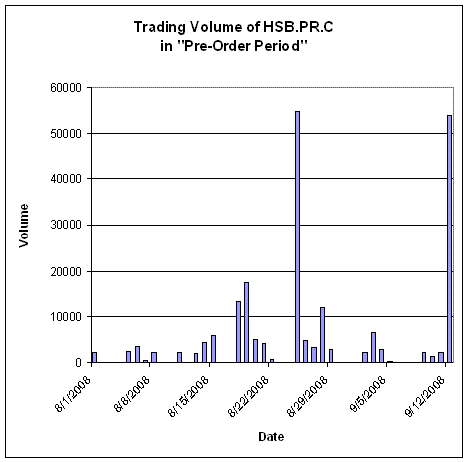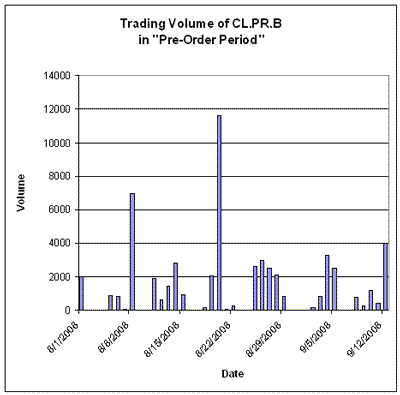IIROC has released its Study on the Impact of the Prohibition on the Short Sale of Interlisted Financial Sector Issuers. This report, according to the press release:
was undertaken at the request of the Canadian Securities Administrators to examine the impact of the Ontario Securities Commission Order prohibiting short sales of certain financial sector issuers (“Restricted Financials”) on trading activity. The Order, issued on September 19, 2008, prohibited short sales of Restricted Financials listed on the Toronto Stock Exchange that were also inter-listed with exchanges in the United States. The IIROC study shows that, prior to the introduction of the prohibition on short sales, short selling activity in Restricted Financials was generally consistent with historic levels of short selling for inter-listed securities.
A big argument in favour of the short selling ban, as some may remember, was:
prevent regulatory arbitrage with respect to short selling in Ontario of the securities of Restricted Financials as a result of initiatives undertaken in the United States by the Securities and Exchange Commission (“SEC”)
Geez, you know, I’ve always thought that one of the differences between Canada and the US is that in Canada we are not subject to US law; we get to make up our own laws instead. Now, I am more than willing to agree that a little communication, if not cooperation, is always in order; and I will also agree that from time to time we will defer to our gigantic neighbor simply because they control the game; and I will also agree that in the case of interlisted securities a difference in short-selling rules could cause unknown-and-possibly-bad things to happen to market tone … but none of these rationales were addressed. In today’s brave new world it is, apparently, entirely sufficient to mumble something about “regulatory arbitrage” without the need to complicate matters by determining what is good for Canadian markets and good for Canada.
I would have met each US political blather about bonus control and criminalization of CDS trading with a political announcement that such activities in Canada were not just going to be encouraged, but actually subsidized! Let’s steal all their business, that’s what I say! But I digress.
One source of amusement is IIROC’s use of significant figures:
For example, as at August 1, 2008, the market capitalization for the Restricted Financials as a group was $291,409,251,788 ranging from a high of $62,525,252,799 for Royal Bank of Canada to a low of $138,929,587 for Thomas Weisel Partners Group Inc. with three other securities having a market capitalization of less than $400,000,000.
It is rare that I see a report containing twelve significant figures (was that at the ask, the bid, the close, the Volume-Weighted-Average-Price, or what, I wonder) and I thank IIROC for publishing these data.
The summary of findings is consistent with everything else I’ve seen:
In summary, during the Study Period:
• the issuance of the Orders did not appear to have had any appreciable effect on the price of securities of either Restricted Financials or Non-Restricted Financial (both of which have performed better than benchmark index of market performance);
• there were “unusual” levels of activity in “financial sector” securities (both the Restricted and Non-Restricted Financials) in the Pre-Order Week;
• the proportion of short sales of Restricted Financials in the Pre-Order Period was in line with, or less than, historic patterns and the evels of short selling for inter-listed securities generally;
• there was no evidence of undue short selling pressure in the Non-Restricted Financials in the Pre-Order Period (including the Pre-Order Week);
• the issuance of the Orders appeared to have had a significant impact on market quality for the trading of the Restricted Financials by:
o reducing liquidity available in the Restricted Financials, and
o increasing the “spread” for Restricted Financials as measured by the difference between the closing bid and ask prices;
However, the most delicious thing about the report is the selection of the control group – the “Non-Restricted Financials”:
The Original Temporary Order applied to the securities of the Restricted Financials, being thirteen issuers from the financial sector that are listed on the TSX and also listed on an exchange in the United States and subject to the initiatives taken by the SEC. IIROC identified seventy-seven other issuers in the financial sector, of which thirty-three securities (“Non-Restricted Financials”) had more than minimal trading activity during the Pre-Order Period.6 Appendix “A” lists the securities which are considered either a Restricted Financial or a Non-Restricted Financial.
Where possible, the analysis compares the performance of the Restricted Financials and the Non-Restricted Financials with the performance of the S&P/TSX Composite Index. Certain of the measures used in the analysis therefore weight the results for the Restricted Financials and Non-Restricted Financials by their market capitalization. Market capitalization was calculated by multiplying the issued capital of each Restricted Financial as at August 31, 2008 by the relevant price for a particular trading day.
Turning to Appendix A, we find two somewhat startling inclusions in the Non-Restricted Financials: CL.PR.B and HSB.PR.C.
The data is not presented in fine enough detail for the impact of the inclusion of preferred shares in the control group to be estimated; I suspect that the effect was small. But to the extent that there was any effect at all, it should have been regarded as irrelevant.
I sympathize with IIROC with respect to the problems they faced in compiling a control group for the major financial issuers … but they might appreciate some advice from an old quant: If you don’t have the data, don’t do the analysis.


Update, 2013-11-13: Link to report updated.
[…] The IIROC report on the short-selling ban has been previously discussed on PrefBlog. […]
[…] paper joins the collection – I have previously reported the IIROC Report on Short Selling Ban and The Undesirable Effects of Banning Short […]